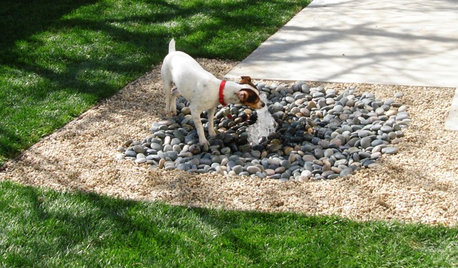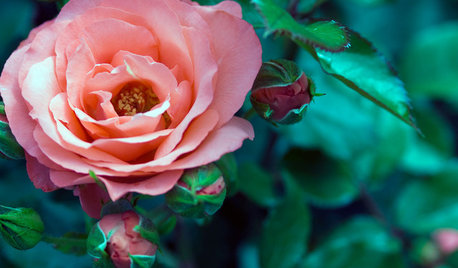This was in the Seattle Post-Intelliger(?)
Any contrary thoughts?
Ann's Organic Garden: Just say nay to horse manure for mulch
By ANN LOVEJOY
SPECIAL TO THE P-I
Every winter I feel the same frustration. The earth smells fresh and sweet, but it is seriously cold out there. The ground is too wet to work, and aggressive weeding can cause soil compaction.
The best way to stay happy in the garden in winter is to spread a lovely blanket of mulch. I try to alternate between washed dairy manure and mature compost, both nutritive soil builders with a handsome appearance.
Compost can be spread pretty much any time, but dairy manure is least smelly in winter. On a brisk day with plummeting temperatures, a little poop scooping will bring roses to your cheeks without causing neighbors to complain.
Often when I write about using manure in the garden, I get a lot of questions. Most often, readers want to know why I don't use horse manure.
In my opinion, horse manure is not suitable for mulch. For one thing, it's full of weed seeds. Horses are basically an extended tube, and much of what goes in comes out in pretty similar form. Weedy feed means weedy poop.
Horses that are given weed-free grain are also usually given wormers. Wormers, too, pass straight down the chute. Since worms are good for the garden, adding worm killers to the compost is not a plan.
Even if feed grain is weed-free, it may contain clopyralid, a persistent herbicide used to control thistles. Unfortunately, it lasts for many years in the soil and is deadly to a large range of plants at tiny concentrations. The residue acts like an herbicide on certain families, notably the nightshades (tomatoes, potatoes, eggplants, petunias), the composites (many herbs and flowers) and legumes (peas and beans).
The organic farmers I know always hot-compost horse manure before using it to avoid possible disease and probable weed problems. Another common problem with horse manure use is that, over time, crops often start showing signs of stunting or slowed growth.
Soil tests can explain why. Adding horse manure to garden soil over many years can result in the buildup of toxic levels of magnesium. Because horses have an incomplete digestion system, sometimes large nutrient residues end up in the soil. Non-water-soluble residues such as minerals can be especially troublesome, in part because symptoms of nutrient excess can mimic symptoms of nutrient deficiency.
Many regional organic growers follow the work of Elaine Ingham, a soil scientist long associated with Oregon State University. Ingham believes that organic or near-organic farming and gardening practices are cheaper, healthier and more effective than the usual chemical fixes.
She has studied numerous organic soil supplements, including manures, and finds that ruminant manures (as from cows) are the most effective at reducing or even reversing certain root rots in our native soils. (Phytopthora is one she commonly mentions.)
Other manures also can be effective, of course. However, according to Ingham's work, horse manure is not. Indeed, she explains that horse manure can actively encourage several root rots.
Ingham's advice coincides with my own experience. I have used manure for much of my adult life (I admit this freely and in public). I also admit that I have never done a formal study on the effects of various manures. However, horse manure made my phytopthora problems worse. Dairy manure made them go away.
I use dairy manure on everything I grow, including edibles. I always put it through a hot composting cycle, often blending it with grass clippings or shredded leaves. One thing I really like about getting washed dairy manure in winter is that it is usually well aged and well composted.
In high season, when everybody is gardening eagerly and manure is in hot demand, manure is apt to be fresh and rank and in serious need of composting. In winter, I can usually spread what I get the same day.
I am frequently asked to recommend a reliable supplier for washed dairy manure. My favorite for reliability, quality and kindness is Mark Vukich. Formerly the driver for Bob Lewis, the man who brought us all Smith Brothers Dairy manure, Mark has carried on the business since Bob's death a few years ago. For a quote, call Vukich at 206-271-6490 or 253-939-0627.
Ann Lovejoy, a Bainbridge gardener, is the author of several gardening books. She can be reached via mail at: 8959 Battlepoint Drive N.E., Bainbridge Island, WA 98110.














remuda1
albert_135 39.17°N 119.76°W 4695ft.
Related Discussions
Zoo poo
Q
Chicken poo and Phosphates and Gypsum, oh my!
Q
how to limit choices? rabbit poo as fertilizer
Q
Ken--if I get 'Bird-Poo Flu', I'm coming for ya..!
Q
Kimmsr
gonefishin
brdldystlu
organicburro
gonefishin
starwoodfarmOriginal Author
raspberryflyer
Kimmsr
gonefishin
joepyeweed
rcnaylor